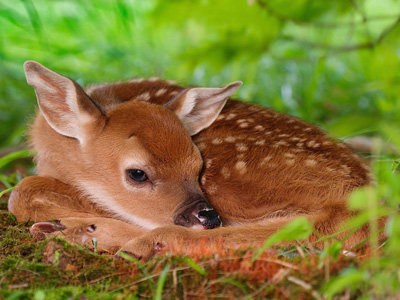Closter Nature Center

Although the Closter Nature Center is licensed for wildlife salvage and exhibition, we are not a licensed rehab center. Please use the list below for places to bring injured or abandoned animals.
Thank you for your cooperation & caring!
Citizens are reminded to keep their distance from newborn fawns and other young wildlife during the warm weather months. Although they may seem as though they're abandoned, helpless and in need of assistance, it usually isn't true. Look -- but don't touch. It could do more harm than good.
Except for when a fawn is nursing, its mother often leaves it alone for long periods so as not to draw predators to the nesting site.
Young animals and birds quickly venture into the world on shaky legs or fragile wings. While most learn about survival from one or both parents, it's normal for some to receive little or no parental care. Wild animal parents often stay away from their young when people are near. It's not unusual to see a young bird crouched in the yard or a young rabbit in the flower garden, both apparently motherless. Finding a fawn lying by itself also is fairly common. Potential peril facing these young animals is a natural part of survival in the wild. Young wildlife that learn well and are the most fit generally live the longest.
If You Care, Leave Them There!
Should you find a fawn or other young wild animal, the best thing to do is to leave it alone. Do not consider young wildlife as possible pets. This is illegal and bad for the animal. Furthermore, wild animals do not make good pets; they are not well suited for life in captivity and may carry diseases that can be transmitted to people. Resist the temptation to take them out of the wild.
If you encounter a young wild animal that is obviously injured or orphaned, call a licensed wildlife rehabilitator for advice and help. Wildlife rehabilitators are volunteers licensed by NJDEP & the NYDEC, and are the only people legally allowed to receive and treat distressed wildlife. The goal of the rehabilitator is to release healthy animals back into the wild, where they belong.
REGIONAL LICENSED WILDLIFE REHABILITATION FACILITIES
Always call ahead of time before visiting these locations!
The Raptor Trust
1390 White Bridge Road
Millington, NJ 07946
908-647-2353
**Birds of Prey / Wild Birds**
Franklin Lakes Animal Hospital
754 Franklin Avenue Franklin Lakes, NJ 07417 201-848-1991
**Native & Exotic Animals**
---Donations Accepted---
Bergen County Animal Shelter
100 United Lane, Teterboro
201-229-4600
Mary Ellen Stout (201) 752-4260**
Wild Animals in addition to domestic Drop-Offs.
Bill Boesenberg -Herpetologist
973-248-9964
**Amphibians/Reptiles: native & exotic**
Plainfield Animal Hospital
2215 Park Ave.
Plainfield, NJ 07080
908-755-2428
**Native Animals- Reptiles/Amphibians**
Bergen County Zoological Park
‘Van Saun Park’
Attn: Tim Gunther
216 Forest Ave; Paramus
201-262-3771
**Most Uninjured Wild Animals**
Englewood Animal Hospital
43 N. Dean St, Englewood
201-568-1751
Robert Groskin & Steve Hornstein
***Red-Eared Slider or Painted Turtles for medical care***
James A. McFaul Environmental Center
Crescent Avenue
Wyckoff, NJ 07481
(201) 891-5571
Mark Lerman, DVM
381 Rte. 306, Monsey, NY
914-354-6602
Trailside Museum & Wildlife Center
Bear Mountain State Park, NY
RT# 9W & P.I.Parkway
Jennifer Verstraete
Nancy McTamaney
(845) 786-2701